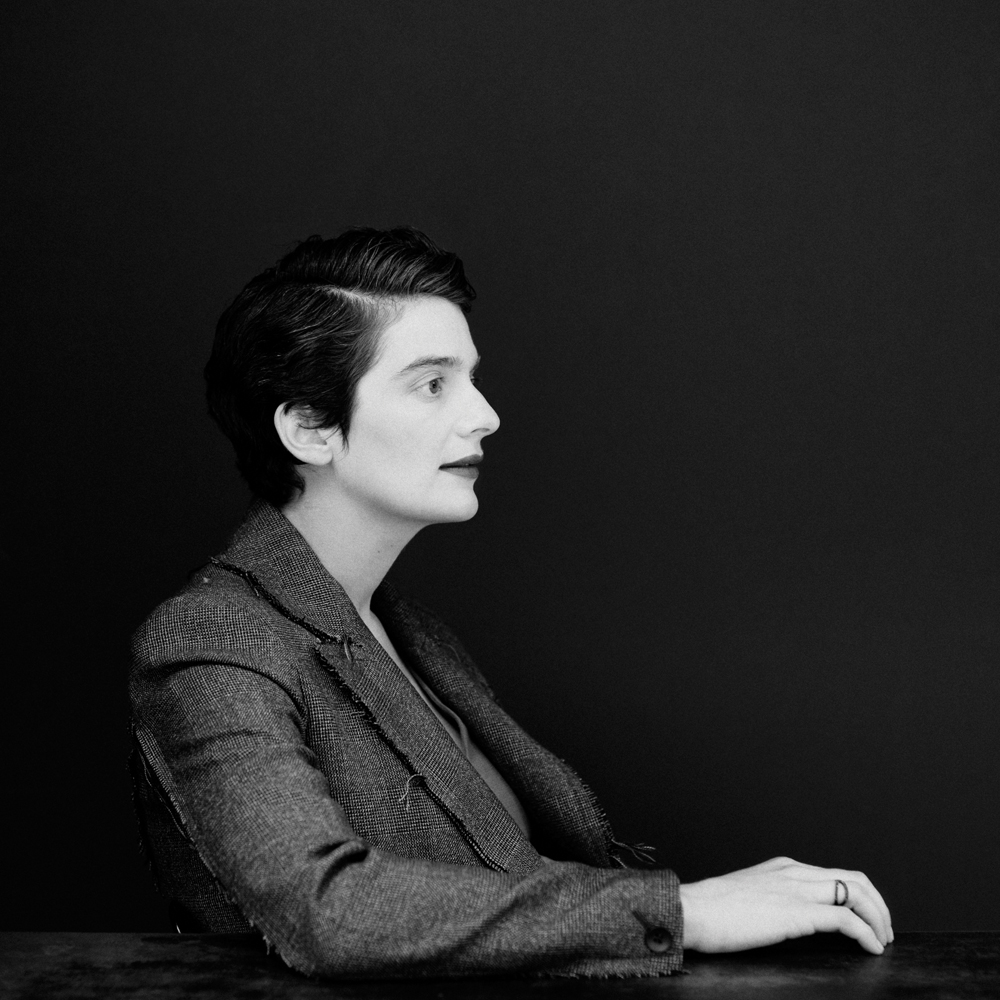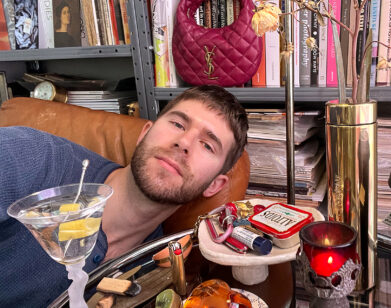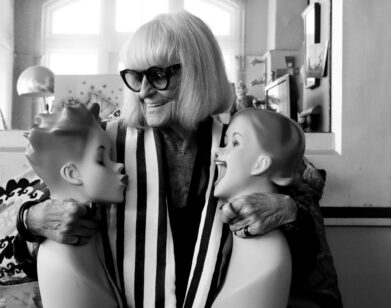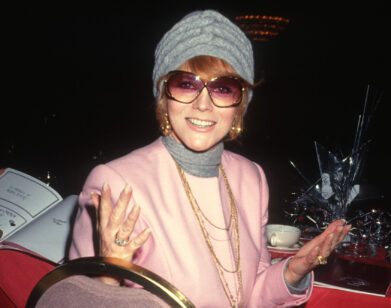Gaby Hoffmann
ABOVE: GABY HOFFMANN IN NEW YORK, AUGUST 2014. PHOTOS: SHAWN BRACKBILL. SITTINGS EDITOR: BRITTANY BERGER. HAIR: ADAM MARKARIAN/BRYAN BANTRY AGENCY. MAKEUP: NINA PARK FOR GIORGIO ARMANI BEAUTY/THE WALL GROUP. MANICURE: KATHERINE ST. PAUL HILL/THE WALL GROUP.SPECIAL THANKS: FAST ASHLEYS.
In 1989, five years before Amazon.com was founded as an online bookseller, a seven-year-old Gaby Hoffmann got her first film role in Field of Dreams. A quarter of a century later, Hoffmann now stars in the online giant’s original TV series Transparent, the pilot of which debuted online in February 2014 to widespread critical acclaim.
Created by Six Feet Under writer and producer Jill Soloway, the show revolves around a loving but unusually open family in Los Angeles who have just discovered that their father, Mort (played by Jeffrey Tambor), has been making the transition to become Maura. There’s oldest sister Sarah (Amy Landecker), a former lesbian turned perfectionist wife and mother; Josh (Jay Duplass), a philandering music producer middle brother; and Hoffmann’s Ali, the youngest sister who, in her early thirties, can’t seem to grow up. Hoffmann plays Ali with a saucy, blunt sense of humor—especially when it comes to teasing her on-screen brother—but we soon see that there’s a flip side to her joking exterior. All episodes are now available to stream on Amazon Prime Instant Video.
Ali is the latest in a quick succession of roles for Hoffmann, who most recently played the Crystal Fairy in the Chilean adventure film Crystal Fairy & the Magical Cactus (2012) and made cameos in the dysfunctional menageries of FX’s Louie and HBO’s Girls. The daughter of Warhol Factory actress and personality Viva, Gaby grew up in New York’s legendary Chelsea Hotel. Beginning in her teens, she took a ten-year hiatus from acting to attend college at Bard and try out various careers, including, but not limited to, doula. I met an eight-month-pregnant Hoffmann for lunch in SoHo.
RACHEL SMALL: How did you become involved with Transparent?
GABBY HOFFMANN: I met Jill Soloway at Sundance a couple years ago. I was there for Crystal Fairy, and she was there for Afternoon Delight. She reached out and wanted to get together. It was, I think, a pretty typical experience for anybody who meets Jill, which in my mind was a little instant love affair. She invited me to this dinner she was throwing with all these amazing women at Sundance, and then we had lunch. It was instant familiarity and curiosity and excitement. Jill and I are very similar in that we get right into it and are very open. In my memory, we were crying within five minutes, talking about our families, hugging. Then she told me about this idea, which obviously was fascinating and exciting. And I thought, “That would be a dream if anybody would let us make that.” That spring I was in L.A. and we played around with some scenes she had written. She shot some stuff, just her and I and our director of photography and an actor. Three months after that, she called and said, “Amazon’s going to do it.” So it was an organic and quick process, which is rare in Hollywood. I just was lucky enough that she somehow thought of me.
SMALL: What were the actual ideas you first discussed?
HOFFMANN: Very much what’s in the pilot. She had conceived of this family, and Jeffrey’s character, Mort, at the point that he’s ready to come out to his family about transitioning. The three siblings, I think, were already formed in her mind. Jill’s mind is incredible. She is so prolific and she’s constantly in a place of imagination. Jill comes very prepared with lots of ideas of her own and beautiful writing. But part of her process is coming with something great, and then leaving space for collaborating with everyone. It was a formed idea, but once we all got together in a room, things revealed themselves. The shape of the family and the specificity of the relationships and characters were just there. All we had to do was get out of the way.
SMALL: I wonder whether you were a muse or inspiration to her? If picturing you as the character helped anchor it?
HOFFMANN: Yeah, she was thinking of me when she was writing. But even with people who came on board after she’d written the pilot, there was a strange magicality to the way this whole thing worked out. It was like she wrote the part for Jay [Duplass] and for Amy [Landecker], without knowing it. And then Jay and Amy sort of popped up. It was like, “You are this person; there’s no one else who could do it.” So everybody was sort of a muse for her—some consciously, some unconsciously.
SMALL: Watching you and Jay in the pilot, I couldn’t help but notice what a great dynamic you had. It seemed natural.
HOFFMANN: These people that make up this family are my favorite people in the world. It’s such an incredible group: They’re my family, my best friends. It just happened. It was like wizardry.
SMALL: You’re character seems lost, but by the end of the pilot, she’s trying to get in shape, having recruited a personal trainer in the park.
HOFFMANN: Well, funny things happen with that pursuit, which I won’t give away. But she’s trying to “get in shape”—not necessarily physically, but she’s trying to get her life in shape and figure out who she is. She’s in her early thirties, so she’s been in that suspended state of identity-crisis twenties for a very long time. I think of her as being slightly paralyzed and being held by this family in a loving way, but in a way that allows her to stay the baby.
SMALL: I found her endearing.
HOFFMANN: She gets into some wacky situations. She can be a real pain in the ass. But, yes—she’s very endearing and very smart, and she has a lot of offer the world and just doesn’t know how to do it yet.
SMALL: Your character in Girls was also quite dysfunctional, albeit in a much more extreme, harmful way. What is the appeal of playing dysfunctional characters?
HOFFMANN: Definitely both of those characters would be considered “dysfunctional” in a sort of general societal way. For an actress, it’s fun to play. Ali is a little bit more complicated, because her difficulty is less apparent. She’s clearly not a functioning adult in the way that we want people to be: She doesn’t have a job or her own bank account or a car and all that stuff, but she’s not ending up in the hospital either. Her issues are expressed in a murkier ways. Playing dysfunctional characters or crazy characters is only fun if they’re well written. So I have been lucky enough to be asked to play crazy people who are very well written.
SMALL: How do you feel about your first regular TV role being on Amazon?
HOFFMANN: It’s so nice that there’s all this new space for new, good content. It’s good news for us actors, since nobody makes real independent films anymore. Amazon has been great. It’s a dream job.
SMALL: What are your memories of living at the Chelsea Hotel in the 1980s?
HOFFMANN: So many memories. It was a really fun place to grow up. I was sort of obsessed with not living there when I was a kid. I wanted to live in the suburbs and have a white picket fence and my own bedroom. And a staircase—I thought having a staircase meant that you were a normal family. I thought somehow if you could transplant us to the suburbs, we would become a normal family. But in retrospect I’m so grateful I grew up in the Chelsea. It’s a unique way to grow up in the city because it functioned almost as if it were a suburban street: a cul-de-sac in a little neighborhood. I would run around; I had friends on different floors. I would hang out in the lobby. I had this sort of community. On 23rd Street, there was this group of Hungarian families who came to New York in the late ’70s called the Squat Theatre. They were this avant-garde Hungarian theater company that left Budapest. Within the hotel and the Squat Theatre down the block, we had this rich neighborhood, full of friends and characters and parental-type figures. At six, I was running around by myself. The entire city felt like my playground. I’m really sad it’s gone.
SMALL: I can see you as this precocious kid who hung out with the adults like it was no big deal.
HOFFMANN: I was raised in a way where there was no distinction between kids and adults. We were all thrown together at the same dinner table talking about everything. My mother certainly never altered the topics of her conversation based on children being present. I thought of myself as an adult trapped in a kid’s body. Had I known what adulthood was like, I would have embraced childhood a little more. Right now I’m pretty focused on the baby. I’m really excited to be a mom. But I’m also really excited to see Transparent—I haven’t seen it yet! I’ve seen the pilot, of course. I’ve never made a show before, so it’s like this an interesting new relationship in my life. And all these wonderful people are involved, so it’s a lot of new relationships, actually.
YOU CAN WATCH HOFFMANN IN TRANSPARENT, NOW AVAILABLE TO STREAM ON AMAZON PRIME INSTANT VIDEO.







